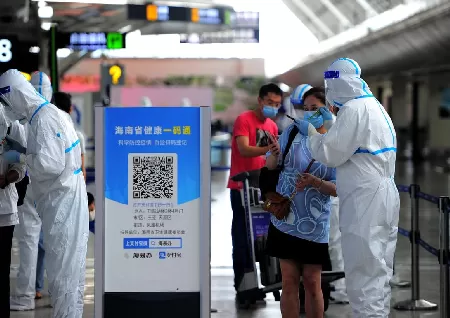U.S. will require travelers from China to show negative COVID test before flight

Travelers from China will need to present a clean COVID test before taking off:
As limitations are loosened and cases are on the rise in China, the US will demand that travellers from China, Hong Kong, and Macau present a negative COVID-19 test before entering the country.
The regulation will become effective for all passengers over the age of two on January 5 as the Centers for Disease Control and Prevention stated on Wednesday.
Whether on a direct trip or one that involves a stopover in another nation, passengers must provide a negative PCR or monitored antigen test no later than two days prior to departure.
The telehealth service or licenced provider must be in charge of the monitored test, and it must be approved by the US Food and Drug Administration.
The CDC cited "the absence of adequate and transparent epidemiological and viral genomic sequence data being reported from" China as well as the country's spike in COVID-19 infections.
In a news release, the CDC warned that "reduced testing and case reporting in China and inadequate sharing of viral genomic sequence data could delay the identification of novel variations of concern, should they develop."
If a passenger has travelled to China within the last 10 days, they will also need to give a negative test at Toronto Pearson International, Vancouver International, and Incheon International Airport in South Korea.
The vast majority of travellers travelling from the PRC and the Special Administrative Regions are served by these three transit hubs, according to the CDC.
In lieu of a negative test result, passengers who tested positive more than 10 days prior to the trip may present proof of virus recovery.
Two days after China eliminated the obligation for foreign travellers to undergo quarantine beginning on January 8, Hong Kong and Macau have now decided to mandate testing for all travellers from these three countries.
In November, widespread demonstrations against China's zero-COVID policy broke out all around the nation, forcing China to reverse a number of initiatives, including mass testing. Chinese public health experts claim that a significant COVID increase that might infect 800 million individuals over the next few months coincided with the relaxation of restrictions.
In order to find novel and uncommon COVID variants, the United States is also expanding its voluntary genomic testing programme (TGS), which gathers anonymous nasal swabs from arriving foreign travellers. The CDC is expanding the initiative to include Los Angeles International Airport and Seattle-Tacoma International Airport, bringing the total number of airports involved to seven.
The CDC stated that TGS "detected two Omicron subvariants, BA.2 and BA.3, during the opening weeks of the Omicron surge and reported them to the global database weeks before they were reported elsewhere, suggesting that the tool is able to detect variations early."
Related queries to this article
- U.S.travelers
- China
- COVID test
Read more articles and stories on InstaSity Trending Topics.





